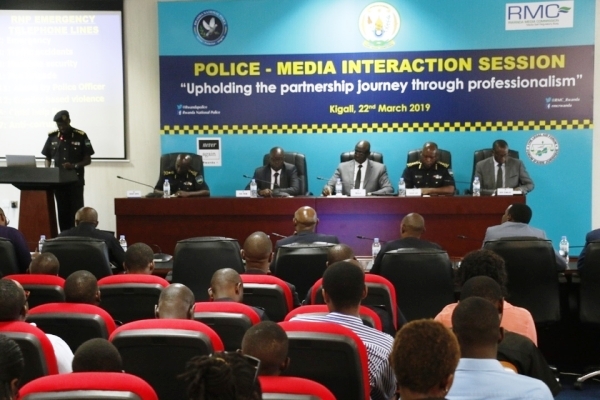
Kigali: The periodic interaction session that brings together Rwanda National Police (RNP) and the media fraternity convened at the force’s headquarters in Kacyiru and discussed measures to strengthen partnership in raising awareness against crimes.
The one-day traditional event focused mainly on security in the forthcoming 25th commemoration of the 1994 Genocide against the Tutsi. They also tackled other areas related to cybercrimes committed through media and internet regulation, and the role of media in security and crime prevention.
At least 150 media practitioners turned up for the session held under the theme: “Upholding the partnership journey through professionalism.”
The Minister of Justice and Attorney General, Johnstone Busingye, while addressing the media, said that “what the country is doing now is for the future of generations” and that media plays an important role in that transformation journey.
He observed that the Police-interaction session is a crucial platform that present the meaning of proactive policing between the two entities whose duty is to “serve the people.”
“Rwanda has made its vision clear in aspects of security and development and we strive for it collectively as public institutions, civil society and the media,” Minister Busingye said.
He added: “The number of people and efforts invested in fighting crimes is way high that criminals themselves, and those efforts will not wither. Corruption, drug and human traffickers will not be entertained.”
Kwibuka 25
The Minister said that commemoration of the 1994 Genocide against the Tutsi is not only to remember innocent lives lost but also forging the future collectively.
Denial and anything related to genocide ideology, he said, shouldn’t be given platform and that freedom of speech and expression should be exercised within the limits of the law.
The interaction session was also attended by the executive secretary for Rwanda Investigation Bureau (RIB), Col. Jeannot Ruhunga, Deputy IGPS; Juvenal Marizamunda of Administration and Personnel and Felix Namuhoranye of Operations; and the executive secretary of the National Commission against Genocide, Dr. Jean Damascene Bizimana, among others.
Dr. Bizimana urged media practitioners to “present facts and the truth about the Genocide.”
“After 25 years, we believe Rwandans understand what is required in the commemoration period and we look at the media as an important entity to tell the truth and continue to educate the public on the tragic past as we shape our destiny,” Dr. Bizimana said.
Genocide ideology related crimes reduced by over 87 per cent, according to Dr. Bizimana.
In this year’s commemoration week, which starts on April 7, a day was reserved (April 9th) for the media, which will look on the role of the media in the 1994 Genocide against the Tutsi and the role of the media in the country’s transformation process.
This year’s commemoration will focus mainly on the young people, and according to Dr. Bizimana, and about 2500 students have so far visited various memorial sites. It is also expected that youth from different parts of the country will be visiting villages for sole elderly survivors in Bugesera, Nyanza and Huye where they were resettled as well war casualties, to be enlightened on the Genocide and liberation struggle, respectively
While discussing on ‘digital media and ethical challenges’, Emmanuel Mugisha, the executive secretary of Rwanda Media Commission—the media self-regulatory body—observed that hate, sensational and fake content continue to be one of unethical and unprofessional behaviours by some media practitioners.
“The media has an obligation to disseminate facts with all honesty and truthfulness… not to disseminate content that incites hatred, violence, obscenity or other unethical acts,” Mugisha said.
At least eight resolutions were adopted, all focusing on professionalism, partnership in media literacy and raising awareness against crimes. (End)
